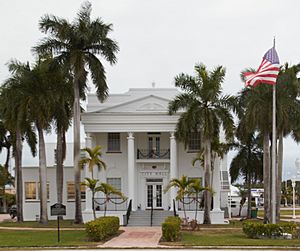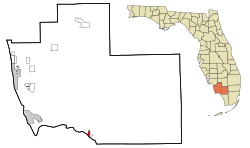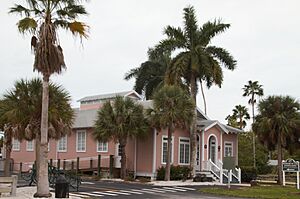Everglades City, Florida facts for kids
Quick facts for kids
Everglades City
|
|
|---|---|
| City of Everglades City | |

Everglades City City Hall
(Old Collier County Courthouse) |
|

Location in Collier County and the state of Florida
|
|
| Country | |
| State | |
| County | |
| Settled (Everglade) | 1873-1895 |
| Incorporated (Town of Everglades) |
1923 |
| Incorporated (City of Everglades) |
1953 |
| Reincorporated (City of Everglades City) | 1965 |
| Government | |
| • Type | Mayor-Council |
| Area | |
| • Total | 1.20 sq mi (3.11 km2) |
| • Land | 0.92 sq mi (2.37 km2) |
| • Water | 0.28 sq mi (0.74 km2) |
| Population
(2020)
|
|
| • Total | 352 |
| • Density | 384.70/sq mi (148.48/km2) |
| Time zone | UTC-5 (Eastern (EST)) |
| • Summer (DST) | UTC-4 (EDT) |
| ZIP code |
34139
|
| Area code(s) | 239 |
| FIPS code | 12-21425 |
Everglades City is a small city in Collier County, Florida, United States. It was once the main town, or county seat, of Collier County. This city is part of a larger area that includes Naples and Marco Island. It is also home to the Gulf Coast Visitor Center for Everglades National Park. In 2020, the city had a population of 352 people.
Contents
Exploring the History of Everglades City
The land around Chokoloskee Bay, where Everglades City is located, was first home to Native American groups for thousands of years. These groups included the Glades culture and later the Calusa people. By the time Florida became part of the United States in 1821, the area was mostly uninhabited.
Early Settlers and Growth
American settlers began arriving after the American Civil War. The first permanent settler was William Smith Allen, who arrived in 1873. Later, George W. Storter, Jr. became a major landowner. He was known for his sugar cane crops and opened a trading post in 1892. The town received its first post office in 1895, named "Everglade." Storter also welcomed tourists who came to hunt and fish, and his home eventually became the famous Rod and Gun Club.
The first school in Everglade started in 1893. However, early school buildings faced challenges, including being destroyed by a tornado and a hurricane. Religious leaders also visited the community, with Methodist ministers serving the area.
Becoming a County Seat
In 1922, Barron Collier bought a lot of land in what was then southern Lee County. In 1923, the Florida legislature created Collier County, and Everglade was chosen as its county seat. That same year, the community officially became the "Town of Everglades."
Collier also helped build important roads and railways. The Tamiami Trail, a major road, passed nearby. He also pushed for the construction of State Road 29, connecting Everglades City to Immokalee. In 1928, the Atlantic Coast Line Railroad began service to Everglades City, making it the southernmost point the railroad reached. The railroad was later removed in 1957.
Changes and New Names
In 1953, the "Town of Everglades" officially became the "City of Everglades." However, in 1960, Hurricane Donna caused significant damage to many homes in the area. Because of this, Florida's legislature moved the county seat to East Naples, Florida two years later. In 1965, the state legislature changed the city's name to the "City of Everglades City."
Geography and Climate
Everglades City is located in the south-central part of Collier County. It sits at the mouth of the Barron River, which flows into Chokoloskee Bay. This bay is about 10 miles (16 km) long and 2 miles (3.2 km) wide. It is separated from the Gulf of Mexico by the northern part of the Ten Thousand Islands. The city covers a total area of 1.2 square miles (3.1 km2), with 0.9 square miles (2.3 km2) being land and 0.2 square miles (0.5 km2) being water.
Understanding the Climate
Everglades City has a tropical climate, much like many places in the Caribbean. This means it generally has warm temperatures all year round. It experiences a tropical savanna climate, which is known for its wet and dry seasons.
| Climate data for Everglades City 5 NE, Florida, 1991–2020 normals, extremes 2007–present | |||||||||||||
|---|---|---|---|---|---|---|---|---|---|---|---|---|---|
| Month | Jan | Feb | Mar | Apr | May | Jun | Jul | Aug | Sep | Oct | Nov | Dec | Year |
| Record high °F (°C) | 92 (33) |
95 (35) |
96 (36) |
99 (37) |
99 (37) |
100 (38) |
99 (37) |
100 (38) |
99 (37) |
96 (36) |
94 (34) |
93 (34) |
100 (38) |
| Mean daily maximum °F (°C) | 77.1 (25.1) |
80.8 (27.1) |
83.3 (28.5) |
86.7 (30.4) |
90.3 (32.4) |
90.9 (32.7) |
92.5 (33.6) |
92.6 (33.7) |
91.1 (32.8) |
87.4 (30.8) |
83.2 (28.4) |
79.7 (26.5) |
86.3 (30.2) |
| Daily mean °F (°C) | 65.1 (18.4) |
68.2 (20.1) |
70.3 (21.3) |
74.4 (23.6) |
78.2 (25.7) |
81.7 (27.6) |
83.7 (28.7) |
83.9 (28.8) |
82.8 (28.2) |
78.7 (25.9) |
72.4 (22.4) |
68.5 (20.3) |
75.7 (24.3) |
| Mean daily minimum °F (°C) | 53.1 (11.7) |
55.7 (13.2) |
57.3 (14.1) |
62.0 (16.7) |
66.1 (18.9) |
72.4 (22.4) |
74.9 (23.8) |
75.3 (24.1) |
74.5 (23.6) |
70.0 (21.1) |
61.6 (16.4) |
57.4 (14.1) |
65.0 (18.3) |
| Record low °F (°C) | 28 (−2) |
29 (−2) |
35 (2) |
41 (5) |
54 (12) |
64 (18) |
70 (21) |
70 (21) |
66 (19) |
45 (7) |
40 (4) |
29 (−2) |
28 (−2) |
| Average precipitation inches (mm) | 1.70 (43) |
2.11 (54) |
2.28 (58) |
2.61 (66) |
3.71 (94) |
11.70 (297) |
7.44 (189) |
7.66 (195) |
9.05 (230) |
3.76 (96) |
1.45 (37) |
1.81 (46) |
55.28 (1,404) |
| Average precipitation days (≥ 0.01 in) | 5.2 | 4.1 | 4.2 | 5.4 | 8.9 | 16.5 | 17.1 | 17.4 | 16.6 | 10.5 | 4.4 | 5.0 | 115.3 |
| Source: NOAA | |||||||||||||
People of Everglades City
A census is an official count of a population. It helps us understand how many people live in a place and what their backgrounds are.
| Historical population | |||
|---|---|---|---|
| Census | Pop. | %± | |
| 1930 | 172 | — | |
| 1940 | 518 | 201.2% | |
| 1950 | 625 | 20.7% | |
| 1960 | 552 | −11.7% | |
| 1970 | 462 | −16.3% | |
| 1980 | 524 | 13.4% | |
| 1990 | 321 | −38.7% | |
| 2000 | 479 | 49.2% | |
| 2010 | 400 | −16.5% | |
| 2020 | 352 | −12.0% | |
| U.S. Decennial Census | |||
Population Changes and Diversity
In 2020, Everglades City had 352 residents. This was a decrease from 400 people counted in the 2010 census. The community is made up of people from various backgrounds.
| Race | Pop 2010 | Pop 2020 | % 2010 | % 2020 |
|---|---|---|---|---|
| White (NH) | 336 | 283 | 84.00% | 80.40% |
| Black or African American (NH) | 3 | 0 | 0.75% | 0.00% |
| Native American or Alaska Native (NH) | 9 | 9 | 2.25% | 2.56% |
| Asian (NH) | 0 | 0 | 0.00% | 0.00% |
| Pacific Islander or Native Hawaiian (NH) | 0 | 0 | 0.00% | 0.00% |
| Some other race (NH) | 0 | 1 | 0.28% | |
| Two or more races/Multiracial (NH) | 7 | 6 | 1.75% | 1.70% |
| Hispanic or Latino (any race) | 45 | 53 | 11.25% | 15.06% |
| Total | 400 | 352 | 100.00% | 100.00% |
Historic Buildings to See
Everglades City has several buildings that are important to its history. These include the Old Collier County Courthouse, the Bank of Everglades Building, and the Everglades Laundry. The old laundry building is now home to the Museum of the Everglades.
Learning and Reading in Everglades City
The public schools in Everglades City are managed by the District School Board of Collier County.
- eCollier Virtual Academy School (K-12)
- Everglades City School (VPK-12)
- Optima Classical Academy School (K-12)
The city also has a place for reading and learning! The Collier County Public Library system serves the area, and the Everglades City Branch Library is located right in town.
See also
 In Spanish: Everglades (Florida) para niños
In Spanish: Everglades (Florida) para niños
 | Bessie Coleman |
 | Spann Watson |
 | Jill E. Brown |
 | Sherman W. White |


